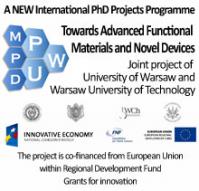Homepage » News » Achievements »
Main results of the ASTRABAT project
EU Horizon 2020 ASTRABAT project, part of which is carried out at the Faculty of Chemistry, Warsaw University of Technology (WUT project manager: Leszek Niedzicki), is nearing the end of its four-year path to developing new high-performance lithium batteries for electric vehicles. The achievements of the ASTRABAT Consortium, which aimed to develop a new lithium-ion cell architecture with an all-solid electrolyte suitable for using new high-energy electrode materials and mass production, are summarized in five info packs. WUT group has been strongly involved in the first two main results, as well as was a leading partner on the third result (fluorine-free ionic liquid plasticizers).
-
An all-solid-state lithium-ion battery with electrolytes tailored for cathode and anode
The aim is for future lithium-based batteries to contain solid electrolytes (SEs) rather than highly flammable, toxic and potentially leaking liquid ones. The ASTRABAT approach pursues this goal by combining two different solid electrolytes, which are optimised for the application on the anode and on the cathode side of a battery, respectively.
Download the info pack. -
Tailor-Made High Voltage Stable Hybrid Fluoropolymer Electrolyte Materials
The widespread use of Ni-rich active cathode materials for next-generation lithium-ion batteries is strongly connected to the development of high-voltage stable electrolyte materials, as a way to avoid fast aging of the battery. Fluoropolymers are well known for their high voltage stability but need to be engineered smartly to meet the requirements of battery applications.
Download the info pack. -
Fluorine-free ionic liquid plasticizers for all-solid-state Li-ion batteries
The most critical new component here is hybrid solid electrolyte, which has to contain plasticizer – an ionic liquid. Within the project, the new set of ionic liquids were synthesised which improve electrolytes far above the state-of-the-art and are fluorine-free.
Download the info pack. -
How to ensure ASTRABAT cell sustainability?
Eco-design and LCA studies have been carried out to address the need to enhance the Lithium-Ion batteries’ sustainability by reducing its carbon footprint and other environmental impacts. The studies also address critical raw material use.
Download the info pack. -
Status of the ASTRABAT cell and prospects of the solid-state batteries market
The info pack provides a status update on the manufacturability of the ASTRABAT cell which has emerged as the first pouch cell prototype in 2022. The ASTRABAT cell, designed with high-energy electrode materials and developed within a European network of experts and engineers, is reviewed in relation to the current state-of-the-art Li-ion cells.
Download the info pack.
(Source: https://astrabat.eu/news/astrabat-releases-info-packs-outlining-the-projects-main-results/)




